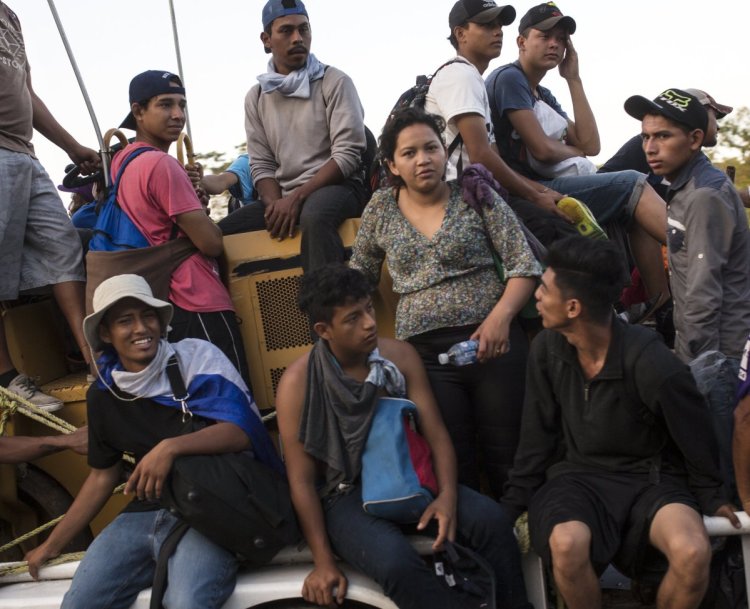HUIXTLA, Mexico — Thousands of Central American migrants renewed their hoped-for march to the United States on Wednesday, setting out before dawn with plans to travel another 45 miles of the more than 1,000 miles still before them.
The five days of walking in the southernmost reaches of Mexico – after seven days in Honduras and Guatemala – were beginning to show: Mexican authorities said Wednesday that about 500 migrants had accepted an offer to be bused back to their countries.
Many said they were sick or exhausted, especially the children who toddled or were carried along on the march.
Still, the size of the caravan – estimated by the United Nations at more than 7,000 strong – seemed basically undiminished as the throng set out in darkness cut by occasional flashlights or the spotlights of municipal police who were escorting them.
Rosa Duvon of Cofradia Cortes in Honduras was pushing two baby boys, both named Daniel – a son and a nephew – in a rickety donated baby carriage over a potholed road at 5 a.m.
“This thing is going to die,” she said of the carriage, pointing to a wobbly back wheel. Still, she vowed to keep going.
In worse condition was Maria del Carmen Mejia of Copan, Honduras, who was already sweating profusely before dawn. She carried in her arms 3-year-old Britany Sofia Alvarado, while with her other hand she clutched the hand of Miralia Alejandra Alvarado, 7, who was also sweaty – and fevered.
Miralia “isn’t well, has a fever. Let’s see if they give us a ride up ahead. I’m worn out now.” But she too pledged to go on. “I’ve walked a long way. I don’t want to return. I want a better future for my children.”
While the group has been discouraged by Mexico’s government – and prompted threats of aid cutoffs for their homelands from President Trump – they have received an outpouring of help from locals as they pass by.
Such caravans have taken place regularly, if on a smaller scale, over the years, but Trump has seized on the phenomenon this year and made it a rallying call for his Republican base ahead of Nov. 6 midterm elections.
Even if they eventually reach the distant U.S. border, many have low odds of qualifying for asylum: The United States does not consider things like fleeing from poverty or gang violence as a qualifying factor.
Send questions/comments to the editors.



Success. Please wait for the page to reload. If the page does not reload within 5 seconds, please refresh the page.
Enter your email and password to access comments.
Hi, to comment on stories you must . This profile is in addition to your subscription and website login.
Already have a commenting profile? .
Invalid username/password.
Please check your email to confirm and complete your registration.
Only subscribers are eligible to post comments. Please subscribe or login first for digital access. Here’s why.
Use the form below to reset your password. When you've submitted your account email, we will send an email with a reset code.